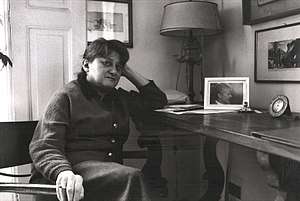Laura Mancinelli
| Laura Mancinelli | |
|---|---|
 Laura Mancinelli | |
| Born |
18 December 1933 Udine, Friuli-Venezia Giulia, Italy |
| Died |
7 July 2016 (aged 82) Turin, Piedmont, Italy |
| Resting place | Exilles Cemetery, Exilles, Piedmont, Italy, IT |
| Occupation | writer, author of historical novels, Germanist and translator, mediaevalist |
| Nationality | Italy |
| Alma mater | University of Turin |
| Notable works | The Twelve Abbots of Challant, The Miracle of Saint Odilia |
Laura Mancinelli OMRI (Italian: [ˈlaura mantʃiˈnɛlli]; 18 December 1933 – 7 July 2016) was an Italian writer, germanist and medievalist.[1]
University lecturer, translator, essayist (numerous essays of medieval history) and author of historical novels.[2][3][4]
Life
Laura Mancinelli was born in Udine in 1933 and lived in Rovereto for four years before moving to Turin with her family in 1937.
After her school education and studies, she graduated from the University of Turin in 1956 with a degree in german literature with a focus on modern literature.
In the years following her doctorate she taught without ever giving up her passion for medieval German culture. In 1969 she wrote the essay The Song of the Nibelungs. Problems and values.
In the seventies she taught germanic philology at the University of Sassari and then called in Venice by the Germanist Ladislao Mittner, in 1976 she obtained the chair of History of German Language at the Ca' Foscari University of Venice.
On the advice of his colleague and friend, Claudio Magris, in 1972 she edited and translated into Italian from the original volume, the Nibelungenlied, followed in 1978 by Tristan (in german: Tristan (Gottfried von Straßburg)) and in 1989 by Gregorius and Poor Heinrich (Hartmann von Aue).
After returning to Turin as holder of the University Chair of Germanic philology, in 1981 Laura Mancinelli made her debut in fiction, publishing, The Twelve Abbots of Challant (winner the same year of the Mondello Prize[5]), a historical novel that the author had begun to write in 1968. After came Il fantasma di Mozart in 1986 and The Miracle of Saint Odilia in 1989.
In the early 1990s, affected by multiple sclerosis, Laura Mancinelli left the Chair of German philology.
From 1994 onwards, she devoted herself entirely to writing and published more than fifteen works throughout the decade, despite hospital stays and lengthy rehabilitation.
In 2009 she published the novel Gli occhiali di Cavour, followed by Due storie d'amore in 2011, free interpretations of the story of two famous couples, Kriemhild and Siegfried, Tristan and Iseult.
Mancinelli died on 7 July 2016 in Turin as a result of her illness [6][7][8][9]. The farewell ceremony took place on 11 July 2016 in the monumental cemetery of Turin; the funeral took place in Exilles in the Susa Valley, where the writer had set one of her novels.
Selected bibliography
Novels
- I dodici abati di Challant (1981; English translation: The Twelve Abbots of Challant, 2003)
- Il miracolo di santa Odilia (1989; English translation: The Miracle of Saint Odilia, 2003)
References
- ↑ "Mancinelli, Laura nell'Enciclopedia Treccani". www.treccani.it.
- ↑ Editore, Giulio Einaudi. "Laura Mancinelli < Einaudi". www.einaudi.it.
- ↑ Editore, Giulio Einaudi. "Laura Mancinelli < Autori < Einaudi". www.einaudi.it.
- ↑ Editore, Giulio Einaudi. "Laura Mancinelli, 1933–2016 < Speciali < Einaudi". www.einaudi.it.
- ↑ RAI Regione Sicilia. "RAI Regione Sicilia – VII Premio Letterario Internazionale Mondello" (in Italian).
- ↑ Isabella Bossi Fedrigotti. "Morta Laura Mancinelli, germanista e scrittrice" (in Italian). Corriere della Sera.
- ↑ Luigi Forte. "Laura Mancinelli, il Medioevo tra rigore e prosa fantastica" (in Italian). La Stampa.
- ↑ "Addio alla scrittrice e germanista Laura Mancinelli" (in Italian). la Repubblica.
- ↑ "TG Valle d'Aosta – Edizione delle 19.30 del 8 luglio 2016" (in Italian).
External links
| Wikimedia Commons has media related to Laura Mancinelli. |